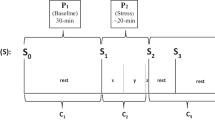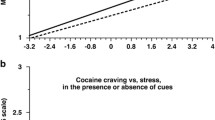Abstract
Background and rationale
The high prevalence of co-occurring alcohol and tobacco use underscores the importance of understanding the influence of alcohol consumption on risk factors for smoking and relapse. Alcohol has been shown to impact reactivity to smoking and stress-related cues, both of which are common antecedents to smoking and smoking relapse.
Objective
The objective of the current study is to examine associations between alcohol use, cigarette craving, and stress reactivity following exposure to smoking and stress cues delivered in participants’ daily lives.
Methods
Using cue-reactivity ecological momentary assessment (CREMA), adult smokers (n = 138) reported cigarette craving, stress, and past hour alcohol use on a mobile device four times per day for 2 weeks, resulting in a range of 4493–5983 data points per analysis. Questions were followed by exposure to pictorial neutral, stressful, or smoking cues delivered via the mobile device. Craving and affect were re-assessed following cue exposure.
Results
Results showed that recent (past hour) alcohol use was significantly associated with increases in the following: (a) tonic (non-cue-elicited) cigarette craving, (b) stress cue-elicited cigarette craving, and (c) stress cue-elicited stress reactivity, in the context of high-baseline stress. There was no significant association between alcohol use and smoking cue-elicited craving.
Conclusions
Alcohol use may increase risk for smoking and relapse to smoking by increasing cigarette craving and, in certain contexts, stress following stress cue exposure. Though alcohol is known for its anxiolytic properties, under some conditions, it may increase reactivity to stress cues.
Similar content being viewed by others
References
Anthony JC, Echeagaray-Wagner F (2000) Epidemiologic analysis of alcohol and tobacco use. Alcohol Res Health 24:201–208
Burton SM, Tiffany ST (1997) The effect of alcohol consumption on craving to smoke. Addiction 92:15–26. doi:10.1111/j.1360-0443.1997.tb03634.x
Businelle MS, Lam CY, Kendzor DE, Cofta-Woerpel L, McClure JB, Cinciripini PM, Wetter DW (2013) Alcohol consumption and urges to smoke among women during a smoking cessation attempt. Exp Clin Psychopharm 21:29–37. doi:10.1037/a0031009
Carter BL, Tiffany ST (1999) Meta-analysis of cue-reactivity in addiction research. Addiction 94:327–340. doi:10.1046/j.1360-0443.1999.9433273.x
Carter BL, Tiffany ST (2001) The cue-availability paradigm: the effects of cigarette availability on cue reactivity in smokers. Exp Clin Psychopharm 9:183–190. doi:10.1037/1064-1297.9.2.183
Childs E, De Wit H (2010) Effects of acute psychosocial stress on cigarette craving and smoking. Nicotine Tob Res 12:449–453. doi:10.1093/ntr/ntp214
Cooper ML, Frone MR, Russell M, Mudar P (1995) Drinking to regulate positive and negative emotions: a motivational model of alcohol use. J Pers Soc Psychol 69:990–1005. doi:10.1037/0022-3514.69.5.990
Delfino RJ, Jamner LD, Whalen CK (2001) Temporal analysis of the relationship of smoking behavior and urges to mood states in men versus women. Nicotine Tob Res 3:235–248. doi:10.1080/14622200110050466
Drobes DJ (2002) Cue reactivity in alcohol and tobacco dependence. Alcohol Clin Exp Res 26:1928–1929. doi:10.1097/01.ALC.0000040983.23182.3A
Falk DE, Yi H, Hiller-Sturmhöfel S (2006) An epidemiologic analysis of co-occurring alcohol and tobacco use and disorders. Alcohol Res Health 29:162–171
Gibbons RD, Hedeker D, DuToit S (2010) Advances in analysis of longitudinal data. Annu Rev Clin Psycho 6:79–107. doi:10.1146/annurev.clinpsy.032408.153550
Harris PA, Taylor R, Thielke R, Payne J, Gonzalez N, Conde JG (2009) Research electronic data capture (REDCap)—a metadata-driven methodology and workflow process for providing translational research informatics support. J Biomed Inform 42:377–381. doi:10.1016/j.jbi.2008.08.010
Heatherton TF, Kozlowski LT, Frecker RC, Fagerström KO (1991) The Fagerström test for nicotine dependence: a revision of the Fagerström Tolerance Questionnaire. Brit J Addict 86:1119–1127. doi:10.1111/j.1360-0443.1991.tb01879.x
Heron KE, Smyth JM (2010) Ecological momentary interventions: incorporating mobile technology into psychosocial and health behaviour treatments. Brit J Health Psych 15:1–39. doi:10.1348/135910709X466063
Kahler CW, Spillane NS, Metrik J (2010) Alcohol use and initial smoking lapses among heavy drinkers in smoking cessation treatment. Nicotine Tob Res 12:781–785. doi:10.1093/ntr/ntq083
Kassel JD, Stroud LR, Paronis CA (2003) Smoking, stress, and negative affect: correlation, causation, and context across stages of smoking. Psychol Bull 129:270–304. doi:10.1037/0033-2909.129.2.270
King AC, Epstein AM (2005) Alcohol dose-dependent increases in smoking urge in light smokers. Alcohol Clin Exp Res 29:547–552. doi:10.1097/01.ALC.0000158839.65251.FE
King A, McNamara P, Conrad M, Cao D (2009) Alcohol-induced increases in smoking behavior for nicotinized and denicotinized cigarettes in men and women. Psychopharmacology 207:107–117. doi:10.1007/s00213-009-1638-9
Lang PJ, Bradley MM, Cuthbert BN (2008) International affective picture system (IAPS): affective ratings of pictures and instruction manual. Technical Report A-8. University of Florida, Gainesville, FL
LaRowe SD, Saladin ME, Carpenter MJ, Upadhyaya HP (2007) Reactivity to nicotine cues over repeated cue reactivity sessions. Addict Behav 32:2888–2899. doi:10.1016/j.addbeh.2007.04.025
McKee SA, Falba T, O’Malley SS, Sindelar J, O’Connor PG (2007) Smoking status as a clinical indicator for alcohol misuse in US adults. Arch Intern Med 167:716–721. doi:10.1001/archinte.167.7.716
Nisbett RE, Wilson TD (1977) Telling more than we can know: verbal reports on mental processes. Psychol Rev 84:231–259. doi:10.1037/0033-295X.84.3.231
Patterson HD, Thompson R (1971) Recovery of inter-block information when block sizes are unequal. Biometrika 58:545–554. doi:10.2307/2334389
Piasecki TM, McCarthy DE, Fiore MC, Baker TB (2008) Alcohol consumption, smoking urge, and the reinforcing effects of cigarettes: an ecological study. Psychol Addict Behav 22:230–239. doi:10.1037/0893-164X.22.2.230
Saladin ME, Gray KM, Carpenter MJ, LaRowe SD, DeSantis SM, Upadhyaya HP (2012) Sex differences in craving and cue reactivity to smoking and negative affect/stress cues. Am J Addiction 2:210–220. doi:10.1111/j.1521-0391.2012.00232.x
SAS Institute Inc (2012) SAS/STAT® 12.1 User’s Guide. Cary, NC: SAS Institute Inc.
Sayette MA (1993) An appraisal-disruption model of alcohol's effects on stress responses in social drinkers. Psychol Bull 114:459–476. doi:10.1037/0033-2909.114.3.459
Sayette MA, Martin CS, Perrott MA, Wertz JM, Hufford MR (2001) A test of the appraisal-disruption model of alcohol and stress. J Stud Alcohol 62:247–256. doi:10.15288/jsa.2001.62.247
Sayette MA, Martin CS, Wertz JM, Perrott MA, Peters AR (2005) The effects of alcohol on cigarette craving in heavy smokers and tobacco chippers. Psychol Addict Behav 19:263–270. doi:10.1037/0893-164X.19.3.263
Sheehan DV, Lecrubier Y, Sheehan KH, Amorim P, Janavs J, Weiller E et al (1998) The Mini-International Neuropsychiatric Interview (MINI): the development and validation of a structured diagnostic psychiatric interview for DSM-IV and ICD-10. J Clin Psychiat 59:22–33
Sher KJ, Grekin ER (2007) Alcohol and affect regulation. In: Gross J (ed) Handbook of emotion regulation. Guilford Press, New York, pp. 560–580
Shiffman S, Paty JA, Gnys M, Kassel JA, Hickcox M (1996) First lapses to smoking: within-subjects analysis of real-time reports. J Consult Psychol 64:366–379. doi:10.1037/0022-006X.64.2.366
Sobell LC, Sobell MB (1992) Timeline follow-back: a technique for assessing self-reported ethanol consumption. In: Allen J, Litten RZ (eds) Measuring alcohol consumption: psychosocial and biological methods. Humana Press, Totowa, NJ, pp. 41–72
Steele CM, Josephs RA (1990) Alcohol myopia: its prized and dangerous effects. Am Psychol 45:921–933
Stone AA, Shiffman S (1994) Ecological momentary assessment (EMA) in behavioral medicine. Ann Behav Med 16:199–202
Tiffany ST, Drobes DJ (1990) Imagery and smoking urges: the manipulation of affective content. Addict Behav 15:531–539. doi:10.1016/0306-4603(90)90053-Z
Warthen MW, Tiffany ST (2009) Evaluation of cue reactivity in the natural environment of smokers using ecological momentary assessment. Exp Clin Psychopharm 17:70–77. doi:10.1037/a0015617
Wray JM, Godleski SA, Tiffany ST (2011) Cue-reactivity in the natural environment of cigarette smokers: the impact of photographic and in vivo smoking stimuli. Psychol Addict Behav 25:733–737. doi:10.1037/a0023687
Wray JM, Gray KM, McClure EA, Carpenter MJ, Tiffany ST, Saladin ME (2015) Sex differences in responses to cues presented in the natural environment of cigarette smokers. Nicotine Tob Res 17:438–442. doi:10.1093/ntr/ntu248
Acknowledgements
This study was supported by the National Institutes of Health grants from the National Institute of Drug Abuse (NIDA P50DA016511, NIDA K01DA036739, NIDA K12DA031794), the National Institute on Alcohol Abuse and Alcoholism (NIAAA T32AA007474), and the National Center for Advancing Translational Sciences (NCATS UL1TR000062, NCATS UL1TR001450). The authors would like to thank L. Beech, E. Borhanian, J. Hinton, C. Horne, C. Johnson, P. Muldrow, D. Paquette, and L. Ueberroth for their invaluable contributions.
Author information
Authors and Affiliations
Corresponding author
Ethics declarations
Conflict of interest
The authors declare that they have no conflict of interest.
Rights and permissions
About this article
Cite this article
Tomko, R.L., Saladin, M.E., McClure, E.A. et al. Alcohol consumption as a predictor of reactivity to smoking and stress cues presented in the natural environment of smokers. Psychopharmacology 234, 427–435 (2017). https://doi.org/10.1007/s00213-016-4472-x
Received:
Accepted:
Published:
Issue Date:
DOI: https://doi.org/10.1007/s00213-016-4472-x




